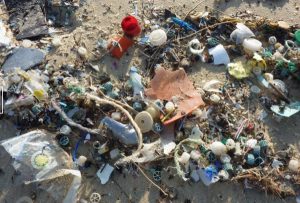20 September 2021
Microplastic pollution in Europe is far more extensive than we previously thought. Sustainable Apparel Coalition/Higg MSI and other ‘sustainability’ tools continue to ignore the latest science.

“Most of our attention on plastic pollution focuses on the oceans, but we discovered that Europe’s lakes — our drinking water sources — are similarly polluted by microscopic plastics and man-made fibers,” lead author Andrew Tanentzap said in a press release.
In the meantime in a different scientific study:
“Experiments showed that while larval fish sometimes eat microplastic particles directly, they are more likely to acquire microplastic particles by ingesting contaminated larval fish. Tests also showed that larval fish were more likely to ingest microplastics when they were attached to a common pollutant — in this case, the pesticide DDT.”
Read more: https://lnkd.in/eCh89w_W
Consumers and (fashion) brands alike are not presently recognizing the true cost of plastics – e.g., polyester shirts, dresses, and pants, “vegan” plastic leather-like materials (including cactus and mushroom leather-like materials that are mixtures of biomass and plastic).
Similarly, regulating authorities are not presently recognizing the true cost of plastics.
A key reason for this is lack of education. A key element behind lack of education/awareness is willful ignorance on the part of key ‘sustainability’ tools used by the textile industry – e.g., Higg MSI’s willful choice to ignore microplastics.
Right now, the Higg MSI, for example, intentionally ignores all environmental aspects of plastic pollution and also does not recognize the true carbon footprint of plastics and bioplastics production. The Higg MSI is a ‘pay to play’ model that uses trade secret data and is not open to public peer review…and is a huge problem.
Due to size and other intrinsic properties, nano and microplastic pollution canNOT (unfortunately) be filtered out of rivers, lakes, and the ocean by, for example, ‘magnets’. (Sorry to say, BBC, but ferro fluids are not a scalable scientific solution that is ready for any significant deployment: https://lnkd.in/eqFebdvH)
There are over a billion wash machines presently in operation…and it would take over $100 billion to install even basic/imperfect filters on all machines and would still not come close to ‘solving’ the problem given plastic clothing may shed as much nano and microplastics during wearing as washing:
Read more: https://lnkd.in/e8CZt35q
From the link above: “The key story here is that the emission of fibers while wearing clothes is likely of a similar order of magnitude as that from washing them.”
The world needs scalable solutions that solve the plastics pollution issue(s) at the root of the problem. Humanity cannot afford to implement never ending waterfall systems of interventions that do not address the root cause(s).
We bring leather, material and fashion businesses together: an opportunity to meet and greet face to face. We bring them from all parts of the world so that they can find fresh partners, discover new customers or suppliers and keep ahead of industry developments.
We organise a number of trade exhibitions which focus on fashion and lifestyle: sectors that are constantly in flux, so visitors and exhibitors alike need to be constantly aware both of the changes around them and those forecast for coming seasons.